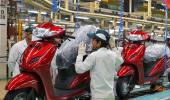'It is going to be extremely rapid and anybody who is not there, be it investor, manufacturer, supplier, will miss out.'

With no playbook available for a success formula for launching an electric vehicle, Naveen Munjal jump-started Hero Electric in 2007.
A lot has changed since then.
With a major policy push, incentives, India is looking to promote usage of electric vehicles.
Munjal's company, by virtue of being the market leader, will be a beneficiary of this change.
In an interview with Arindam Majumder, Munjal outlined his plans for the company and his learnings.
You have bet on the sector much before electric became a buzzword. Not always it was successful. What is the change that you notice about EV since then?
When you enter into new space there is no precedent for a successful business model.
That was not available then. We came in too early.
But if we hadn't come at that point of time, we wouldn't have the level of experience that we have now.
Now it is a very exciting time whether it is from the central or state governments, finances are falling into place.
I believe now we are at a stage where there will be a huge amount of growth.
I believe we are not going to look back now.
The Performance Linked Incentive scheme has been announced to give an impetus to advanced technologies like EV. However, the eligibility criteria of having minimum revenue of Rs 10,000 crore with a fixed asset block of Rs 3,000 crore will leave out companies like that of Hero Electric.
The policy makes its intent clear of pushing electric and zero emission vehicles.
That is very good. Any policy that comes out also evolves with time.
Once you keep on monitoring the implementation of the policy, things mature and then fall in place.
We have seen the same for FAME II policy where an amendment done in June this year transformed it into a very productive policy.
Similarly, I believe monitoring is going to happen from the government's end to make this policy a great success.
How does the entry of a deep pocket company like Ola change the dynamics of the sector? Will we witness a price war in electric two-wheeler segment?
I can't comment on other company's strategies.
But I can say from our company's perspective that prices have dropped due to the FAME subsidy.
The subsidy is being passed on to the customer.
The price drop has happened without sacrificing our margins.
We also don't want to talk about the path of price war because then there is no stopping.
I think companies looking to have a long-term future in this sector believe that once you go beyond a certain threshold, then it is difficult to get back pricing power.
Also, with volumes coming in, prices are going to drop further.
With the ecosystem getting stronger, customers will get a better product.
Eventually, it will be up to the customer of what product he wants to choose.
The price is not the only differentiator.
He will look at customer support, battery replacement cost and there will be different segments.
You will have the mass segment which will be price sensitive and then the lifestyle segment which will be price agnostic.
You recently raised funding of Rs 220 crore. Has the mindset of investors towards the sector changed from what you have seen earlier?
Hugely! A number of investors with whom things didn't work out when we met them earlier, they are now chasing us.
What they are finding now is there is now an inflection point which we have reached.
The change to electricity is happening faster than many people had anticipated.
It is going to be extremely rapid and anybody who is not there, be it investor, manufacturer, supplier, will miss out.
What are your expansion plans?
Currently the demand is outpacing the supply.
So, we are expanding manufacturing.
By mid-2022, we will have 500,000-unit capacity which is five times more than what we have now.
We are going to add a capacity of a million units every year for the next five years.
We currently have about 700 dealers which will go up substantially and increase our service network.
We have trained around 6,000 of these roadside mechanics which will be increased to 25,000 in the next couple of years.
Do you think the government should set a deadline for phasing out internal combustion (engines or the transformation to electric should happen naturally?
I believe targets are required.
The goals that you set for each category of vehicles will be different.
The speed at which two wheelers can convert to electric will not be the same for commercial vehicles.
So, I believe a goal is required.
We moved from BS IV to BS VI.
There was a deadline and the government stuck to that deadline.
Everything else fell into place. Here also if a deadline is given which is five to six years from now, then we can do a backward calculation.
We can start working on the infrastructure, supply base, and vendors.
Feature Presentation: Aslam Hunani/Rediff.com












 © 2025
© 2025